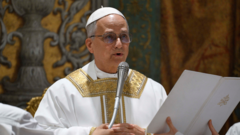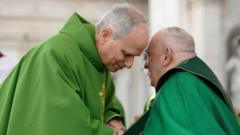As Pope Leo XIV, formerly Cardinal Robert Francis Prevost, gets set to celebrate his first Mass, he stands at a pivotal moment for the Roman Catholic Church, tasked with navigating complex theological and social dilemmas. Elected after a quick conclave, he quickly charmed audiences with his rousing address from St. Peter's Basilica, emphasizing unity and social responsibility. Those familiar with him from his time in Peru speak to his dedication to the underprivileged, and early signals suggest that he aims to continue the progressive ethos of his predecessor, Pope Francis. Meanwhile, his roots in Chicago, alongside his culturally rich background, may illuminate how he might reinterpret the church's mission as he grapples with both contemporary issues and historical traditions.
**First American Pope Leo XIV Faces Church's Future Challenges**

**First American Pope Leo XIV Faces Church's Future Challenges**
Pope Leo XIV, the first American pontiff, prepares for his inaugural Mass amid high hopes and expectations for the Catholic Church's direction.
The new pontiff, who was born in Chicago, will celebrate his first Mass at the Vatican's Sistine Chapel on Friday, ushering in a period of introspection and decision-making. He was greeted with enthusiasm during his emergence as the first American pope, and soon plans to address vital issues concerning the future direction of the Catholic Church. Despite his American upbringing, Leo XIV's time immersed in Peru has shaped his perspective on global theological and social issues, which he is poised to confront head-on.
His election resonates significantly beyond American borders; it symbolizes a bridge to Latin America, where he is embraced as a native son by the Peruvian community. Advocacy for the marginalized and a commitment to fostering dialogue around urgent themes such as immigration are anticipated as integral aspects of his papacy. Whether these initial priorities will evolve further into a broader religious and social framework remains a focal point for theologians and laymen alike.
Pope Leo XIV's choice to honor his predecessor by adopting the name 'Leo' invokes a historical lineage of exceptional leadership, indicative of a potential alignment with contemporary socio-political narratives. As he reaches out to the faithful, offering messages of hope and social justice, his journey is expected to reflect the multifaceted nature of the Roman Catholic Church amid an increasingly divided world.
In a moment of familial pride, John Prevost, the new pope’s brother, reflects on their childhood in the Chicago area, emphasizing Leo's humility and enduring commitment to supporting the disenfranchised. Pope Leo XIV's background, with deep roots in both the United States and Peru, adds a layer of complexity to his identity as he begins this monumental chapter in his life as the leader of 1.4 billion Catholics worldwide.
As further details about his policies and leisure priorities unfold, the coming weeks will be crucial in determining how Leo XIV will define his papacy, balancing tradition with modern challenges.
His election resonates significantly beyond American borders; it symbolizes a bridge to Latin America, where he is embraced as a native son by the Peruvian community. Advocacy for the marginalized and a commitment to fostering dialogue around urgent themes such as immigration are anticipated as integral aspects of his papacy. Whether these initial priorities will evolve further into a broader religious and social framework remains a focal point for theologians and laymen alike.
Pope Leo XIV's choice to honor his predecessor by adopting the name 'Leo' invokes a historical lineage of exceptional leadership, indicative of a potential alignment with contemporary socio-political narratives. As he reaches out to the faithful, offering messages of hope and social justice, his journey is expected to reflect the multifaceted nature of the Roman Catholic Church amid an increasingly divided world.
In a moment of familial pride, John Prevost, the new pope’s brother, reflects on their childhood in the Chicago area, emphasizing Leo's humility and enduring commitment to supporting the disenfranchised. Pope Leo XIV's background, with deep roots in both the United States and Peru, adds a layer of complexity to his identity as he begins this monumental chapter in his life as the leader of 1.4 billion Catholics worldwide.
As further details about his policies and leisure priorities unfold, the coming weeks will be crucial in determining how Leo XIV will define his papacy, balancing tradition with modern challenges.





















